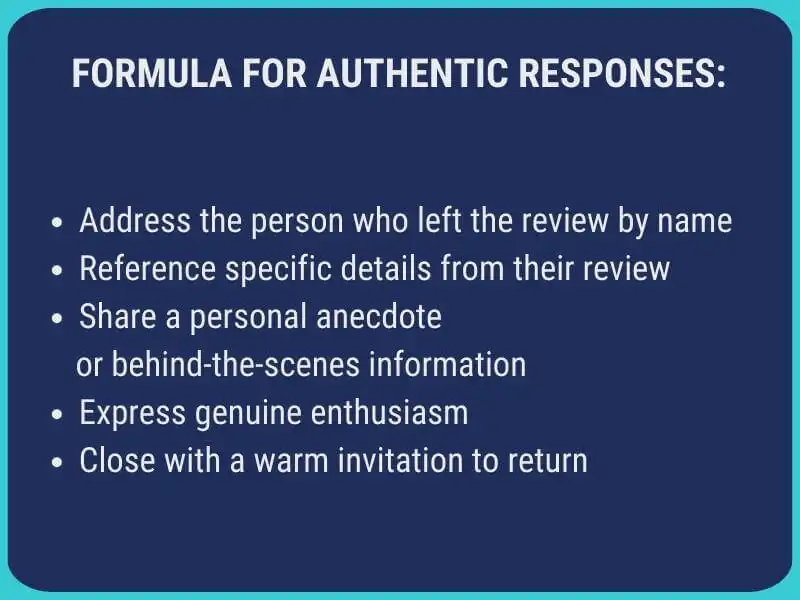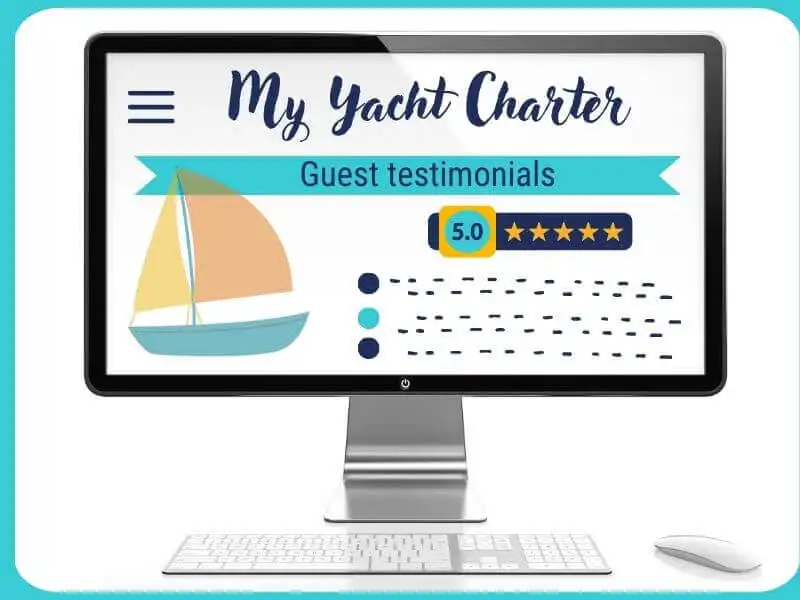
- 21.10.2024.
- News, User experience
Positive reviews can really propel your business forward. But it’s all about how you "use" them. Your responding to the review is more than just showing good manners—it's a move that can affect your whole yacht charter company's success.
Some companies choose to respond only to negative reviews, believing (wrongly) it's more important to address complaints than to acknowledge praise.
They focus their limited time and resources on damage control, hoping to mitigate the impact of criticism and undesirable feedback.
However, this approach makes all the benefits of positive reviews void.
You are missing out on a great opportunity - to strengthen customer relationships and show off your service.
Isn’t that the whole point of your yacht charter company?

Beyond the simple "Thank you" - acknowledging praise
When a guest takes the time to write a positive review, they do much more than put a few words out there.
They're actually opening a dialogue.
Your response is an opportunity to show that you value their input and appreciate them as guests on your vessel.
It's a chance to strengthen the connection you've built during their charter experience.
A simple "thanks for your review" is like a... A limp handshake.
Yes, you’ve got the job done (said your thank you’s), but as far as the impression goes...? You've (to say at least) done poorly.
Instead, try something like:
"We're thrilled that you enjoyed your cruise along the Adriatic coast. Your description of the 'breathtaking views' and 'impeccable service' means a lot to our team. We can't wait to welcome you aboard again for another unforgettable adventure."
This response shows that you’ve done the most important thing on the list - you've actually read the review and taken into account their feedback.
You have also reinforced the positive experiences they've shared.
The ripple effects - positive responses boost your reputation
When you respond to positive reviews (truthfully and with interest), you're not just communicating with the person who left the review—you're speaking to every potential guest who reads your exchange.
Your responses become part of your brand's public image, showing your attentiveness and professionalism.
Responding to positive reviews can make your reputation better because you can:
- Demonstrate engagement - shows you're actively involved in your guests' experiences
- Highlights consistency - reinforces that positive experiences are the norm, not the exception
- Build trust - proves you value guests’ feedback and take it seriously
- Personalise your brand - gives your company a voice and personality
- Encourage word-of-mouth - satisfied guests are more likely to recommend you to others

How to encourage more guests to leave positive reviews?
Are you aware that for every guest who leaves a review, there are many, many more who remain silent?
By responding to the reviews you do receive, you're sending a message to all your guests: their opinions matter.
Try these techniques to motivate more reviews:
- Mention in your response how valuable reviews are to your business
- Create a simple, post-charter email template asking for feedback
- Give small encouragements, like a discount on a future booking, for leaving a review
- Share positive reviews on your social media to show you're listening
- Train your crew to "remind” your guests to leave reviews after their charter

A positive response manual for your yacht charter company
First, you’ll have to learn all about the Art of Authenticity, i.e. personalising your responses without sounding robotic or responding to all with the same message.
With every passing day, AI-generated responses are becoming commonplace.
This means that you can use personalisation and authenticity to your advantage.
Your goal should be crafting genuine responses and avoiding sounding like a chatbot on autopilot.
Here's “a formula” for authentic responses:
- Address the person who left the review by name
- Reference specific details from their review
- Share a personal anecdote or behind-the-scenes information
- Express genuine enthusiasm
- Close with a warm invitation to return
For example:
"Alex, reading about your family's snorkelling adventure in Telaščica brought back memories of when our first guests came back from that nature park many years ago. Your “underwater wonders” description perfectly captures what makes that spot so special. We'd love to help you explore more on your next vacation with us. And yes, you have given us a great idea for our next team building."
It's also important to be “future-focused” and subtly encourage repeat bookings.
While your primary goal is to express gratitude, there's no harm in dropping a hint for future charters. The key is to be subtle and non-pushy. Instead of a hard sell, focus on creating anticipation for future adventures.
Try these approaches:
- We can't wait to show you even more hidden coves on your next visit!
- There's always something new to discover in the Adriatic Islands—we'd love to advise you again on the best sailing spots.
- Your enthusiasm for sailing has us excited about the new spots we're exploring this season.

Acknowledge crew members and employees mentioned in reviews
When a guest takes the time to praise your specific employee, it's a great opportunity to acknowledge your employees publicly.
This makes your team feel appreciated and demonstrates to potential guests that you have exceptional (and valued) people working for you.
Here are some tips on giving your employees the recognition they deserve:
- Skipper Marko was thrilled to hear your kind words about his local knowledge and already planning new routes for your next adventure!
- We'll make sure to pass along your compliments to Ana. Her smile and helpfulness have become quite important among our guests!
The difference between positive vs. negative review responses
The tone you use in response to a positive review should be considerably different from how you address a negative one.
For positive reviews, your “voice” should be upbeat, enthusiastic (but not overly), and celebratory. You're essentially joining in the guest's satisfaction and amplifying it.
Examples of positive response tone of voice:
- We're so glad that you loved your experience in the Adriatic Sea.
- Your review has our whole team wearing a huge smile.
- Reading about your family's wonderful time aboard the [vessel name] has made our day.
For negative reviews, your tone needs to shift to one of empathy, professionalism, and problem-solving. You're not to be enthusiastic here; you're rebuilding trust.
Examples of negative response tone of voice:
- We're concerned to hear about the issues you experienced during your charter.
- Your satisfaction is our top priority, and we are interested in rectifying the situation that occurred in this instance.
- We appreciate you bringing these problems to our attention and would like to make things right.
Finding the right balance for each response type
While all reviews deserve a prompt response, negative reviews require a bit more urgency.
If possible, respond to negative reviews within 24-hour period. This can also prevent potential guests from being swayed by unanswered criticisms from others.
Positive reviews don't demand the same immediacy but don't leave them neglected either. Responding in time also keeps the positive momentum going. It shows that you value all feedback you get, not just complaints.
There's no need to take positive reviews to private conversations unless the guest has asked a specific question that requires a detailed or personal response.
Negative reviews often require a two-step approach:
- Respond publicly to acknowledge the issues and show others you take feedback seriously.
- Invite the person who wrote the review to continue the conversation privately via email or phone. This allows you to discuss sensitive details or negotiate solutions without revealing too much.

Be sure to include positive feedback in your online presence
Your website is, in most cases, the first point of contact for potential guests. Include positive reviews in it to create a powerful first impression.
You can try some of these strategies:
- Dedicate a whole page to testimonials, organised by charter type or destination
- Use a rotating review widget on your homepage
- Include relevant reviews on specific yacht or itinerary pages
- Create video montages of guest's reviews
- Develop an interactive map showing reviews from different charter locations
There are also advanced strategies for positive review responses.
Include mini-narratives into your replies and transform them into stories that complement the reviewer's experience:
"Jenny, your description of the bioluminescent bay brought back vivid memories. Your feelings mirror how we felt when we first discovered that magical spot years ago. We're so happy you shared that experience with us and can’t wait for you to reveal more of the Adriatic’s secrets."
Use additional questions to keep the conversation going and show genuine interest, such as:
- What was your favourite dish from the restaurant you visited on Kornati?
- If you could design your dream itinerary for your next charter, what would it include?
- Which of our local recommendations did you enjoy the most?
- What was the most surprising discovery about the Croatian coast?
- If you could save time in a bottle from your trip to relive later, which moment would it be?
If you want to go above and beyond ordinary words to show your appreciation for exceptional reviews, you can send a personalised thank-you note and a small, branded gift or offer a complimentary upgrade on their next charter.

Implementing the methods mentioned earlier does more than upgrade your feedback skills; it turns praise into a catalyst for expanding your charter business.
Every positive comment gives you a chance to highlight your commitment to top-tier experiences, cultivating a devoted audience among your guests.
By engaging meaningfully with your guests, you're paving the way for ongoing success and fostering a community of supporters who praise your services and vessels far and wide.
Ready to bring your review game to the next level?
Don't let another review be left unanswered – contact us now and learn how you can give the best feedback.
Categories of trends
- News
- Sale
- Marketing
- SEO
- Web design
- Social media
- Technology
- Regulations
- Management
- Education
- Finances
- User experience
Newsletter
Sign up for the newsletter and receive the latest trends and tips straight to your inbox



